Zimbabwe Red Cross Society
The Zimbabwean Red Cross Society is a member organization of the International Federation of the Red Cross and Red Crescent Societies (IFRC), which is the largest volunteer driven organization on earth. The Red Cross Society has 100 million members and a presence in 189 countries.
Zimbabwean Red Cross Society is an Official Auxiliary to the Government in Humanitarian Aid.
Humanitarian services in Zimbabwe can be traced back to the late 1800’s. The Zimbabwean Red Cross Society was established in 1921 and admitted into the IFRC in 1929.
Today the Zimbabwe Red Cross Society is a member of the IFRC Governing Board.
It has three main movements:

The International Committee of the Red Cross (ICRC).

The International Federation of Red Crescent

Red Crescent Societies.
189 member Red Cross and Red Crescent Societies.
As partners, the different members of the Movement support communities in becoming stronger and safer through a variety of development projects and humanitarian activities. The Movement also works in cooperation with governments, donors and other aid organizations to assist vulnerable people around the world.
Our Vision
To become a dynamic voluntary organization which leads in the satisfaction of humanitarian needs and promoting human dignity of the most vulnerable groups.
Read moreOur Mission
To provide timely, appropriate and acceptable humanitarian services to the most vulnerable groups through well managed programs in:
Health and Social Services
Disaster Management
Organizational Development
while encouraging self- reliance and the promotion of human dignity
Read more
Our Core Values
Integrity and professionalism
Transparency and Accountability
Commitment to Serving Humanity
Read more
Our Principles
The Fundamental Principles are an expression of the Red Cross Red Crescent Movement’s values and practices. They were developed based on the Movement’s experience responding to suffering and needs over the previous century. The Fundamental Principles are at once operational and aspirational. They serve both as a guide for action and as the Movement’s common identity and purpose.
Read more
Who We are
The Zimbabwe Red Cross Society (ZRCS) is a humanitarian organisation whose aim is to alleviate the suffering of the most vulnerable communities. It is an auxiliary to government as mandated through the Zimbabwe Red Cross Society Act No 30 of 1981 (Chapter 17.08.) It has branches throughout the country and is part of the global Red Cross movement present in 192 countries.
The Red Cross is quite a unique humanitarian player, locally and globally. National Societies are recognized by all Governments as auxiliary to the public authorities in the humanitarian field. In our case, the Zimbabwe Red Cross Society was established through an Act of Parliament in 1981 as an auxiliary to the Government of Zimbabwe’s humanitarian interventions. This Act is befittingly administered through the Ministry of Defence as the primary role of the Red Cross is to augment army medical units.
This means the Red Cross is not a non- governmental organisation. It is a civil society organisation created by law as auxiliary to its respective public authorities. This special status means that a National Society is a permanent fixture within the civic life of a country, and can work within all parts of the society to address the needs of the vulnerable.

It is important to note that generally, governments have the primary responsibility to address the vulnerabilities that exist in their countries, and a main function of the auxiliary role of the Red Cross is to supplement them in the fulfilment of that responsibility.
In particular, Section 4 of the ZRCS Act outlines the objects of Society include:
- in times of peace to make preparations for the carrying out of its functions in the event of armed conflict;
- on its own initiative to organize emergency relief to victims of disasters, however caused, where possible in accordance with a national plan;
- in co-operation with public authorities where this is possible, to encourage, support and carry on any activity which relieves suffering and promotes the health and welfare of the community, and to provide public instruction in such activities:
- to inspire boys and girls of school age with the ideals of the Junior Red Cross, namely health, service and international friendship, and to form Junior Units wherever possible;
- to interest and instruct public and official opinion in the work of the Red Cross, in the Geneva Conventions and in the principles which inspire the Red Cross and the Geneva Conventions;
- generally, to carry out and assist in work for the improvement of health, the prevention of disease and the alleviation of suffering wherever it may occur in times of peace or armed conflict.
As a disaster relief organisation, the ZRCS is also a member of the Civil Protection Unit (CPU) and we respond to both natural and man-made disasters.
Over the years, we have been implementing integrated humanitarian programmes that provide a holistic approach to the diverse humanitarian needs of the vulnerable groups in Zimbabwe. The programmes include Disaster Management, Food Security and Livelihoods, Water and Sanitation, Health and Social Services, Restoration of Family Links, Organisational Development as well as First Aid and Nurse Aide Training.
Our current focus under Disaster Management is the Community Based Disaster Risk Reduction (CBDRR) programmes as well as Urban Disaster Risk Reduction which all have a preparedness component.
Consistent with our Strategic direction, the Zimbabwe Red Cross Society’s key areas of focus include Disaster Risk Reduction (DRR), Water and Sanitation & Health (WASH), Youth Development and Volunteer Network.
The Zimbabwe Red Cross Society is a First Aid and nurse aide trainer of choice with internationally accepted certificates.
Zimbabwe Red Cross Society has continued to be an integral player in disaster situations at the same time championing developmental programmes that have helped entrench home grown solutions to everyday challenges.
As guided by its 7 fundamental principles of Humanity, Impartiality, Neutrality, Independence, Voluntary Services, Unity and Universality; the organisation does not discriminate and alleviates human suffering wherever it is found and however it is caused.
Our Partners















